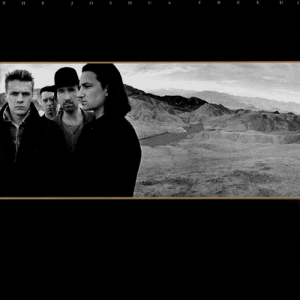Monday, April 10, 2017
Memories Of The Joshua Tree At 30
It was a gorgeous spring day today. Due to the Passover holiday, I don't have to go to work tomorrow or Wednesday, so when I stepped off the commuter train into brilliant sunshine, I felt a brush of the divine. The long dark winter seemed to melt away in an instant. When I got in my car, I knew what to do. I rolled down my windows, and fired up "Where the Streets Have No Name" and drove home with the wind in my hair.
I suddenly remembered that the The Joshua Tree turned 30 in March. Its music was some of the first contemporary music that ever meant anything real to me. The reason isn't a happy one, though. It was thirty years ago this April that my grandfather passed away, the first person I was very close to who ever died. He lived about thirty miles away from my hometown, in a tiny rural village that required lots of backroads driving. On the many days we drove back and forth from Hastings to Lawrence for funeral preparations, the funeral itself, and to check in on my grandmother, the radio in my parents' van seemed to play "With Or Without You." To this day I still cannot listen to that song without thinking about my grandfather's death. Even though it's a love song, it's one drenched in a sense of loss and powerlessness, things I was feeling very intensely in my 11 year old soul at the time.
It is very easy to mock U2 these days, it's practically become its own cottage industry. But in 1987, in the midst of the stasis of the later Reagan years and pop music and hair metal with about as much soul as a slice of processed cheese, U2 was a breath of fresh air. As insufferable as Bono can be in his constant political moralizing that lacks a proper level of self-awareness, after years of Reagan and Thatcher and the big dumb lobotomy of 80s pop culture it was exhilarating to hear the anti-imperialist critique contained in a song like "Bullet The Blue Sky."After years of Cold War bullshit, hearing a song about the Mothers of the Disappeared, their children murdered by regimes that had the support of the United States government, felt positively revolutionary.
The songs that were warmer to America (the subject of most of U2's music from about 1984-1989), were more inclined towards the places most Americans choose to overlook. I think here especially of "In God's Country," a wonderful evocation of what it's like to drive through the expansive deserts of the American west. In their video for "I Still Haven't Found What I'm Looking For" the band wanders around Fremont Street, in the seedier, now forgotten part of Las Vegas.
It took awhile before I was sophisticated enough to know that this album was reflecting my country back to me from the point of view of outsiders. That moment I think came when I was in college, when through my Latin American history classes I learned about the real Mothers of the Disappeared. It's also when this album took on another meaning. My friend Lorna really loved it, and back then, I had it on tape, a tape that pretty much lived in my car. On more than one occasion we'd be driving back to the dorms (I was one of the few car owners in our circle of friends on an urban campus), and she'd demand we drive around the block until the last song on side one finished. That song was "Running To Stand Still," a ballad ostensibly about heroin abuse. I hear it now, twenty years after those young and free days, and only think of the blazing fire of college friendships, a fire that lives on in my memory, a fire that those old photos on Facebook can only barely represent.
The Joshua Tree may be the only album in my collection with two such powerful memory triggers spaced ten years apart. It's a wonderful record and it still holds up. Forget every annoying thing Bono has done in the last twenty years and the fact that they put that crappy album on your iPhone without your permission. Give a new listen, and hear the dreams of a time not unlike our own.
Subscribe to:
Post Comments (Atom)

No comments:
Post a Comment